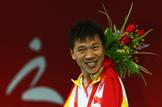
He Junquan is a Chinese swimmer and has won many Paralympic(残奥会) gold medals. Born in Jingmen, Hubei province, He Junquan was a healthy boy. But one day at the age of three, he climbed up to the high-voltage electricity(高压线) box and lost both of his arms forever. He became a disabled boy!
From then on he learnt to do everything with his feet: writing, eating, getting dressed and taking things. Seeing other pupils swimming in the river, he jumped in, too. Without arms, he suffered a lot in the river at the beginning. But he finally learnt to balance himself in water and could swim much faster than the other pupils. Once he even saved a little boy who fell into the water and couldn’t swim. His father was so happy to see that this son had a talent in swimming.
In 1995, He Junquan became a real swimmer. He practices swimming for more than four hours every day. Since 1996, he has won more than twelve gold medals of the world class. At the 2008 Summer Paralympics, he won a silver medal. Reporting on the competition at the 2008 Games, Will Swanton of the Sydney Morning Herald wrote:
“The Water Cube has been a sight for sore(气愤的) eyes. China’s He Junquan, with no arms, was leading the 50m backstroke(仰泳) final. … He came to the finish— and had to crash into the wall with his head. As he slowed down to lessen(减少) the impact(撞击力), Brazilian Daniel Dias hit the wall first with a hand. You’ve never heard a silence like it.”
小题1:What happened to He Junquan when he was three?
| A.He climbed up the tree but failed onto the ground. |
| B.He saved a little boy who fell into the river and couldn’t swim. |
| C.He climbed up to the high-voltage electricity box and lost his two arms. |
| D.He began to practice swimming in the swimming pool with the other children. |
小题2:How did He Junquan do everything after he became disabled?
| A.With his feet. | B.With his mouth. |
| C.With his legs. | D.With his hands. |
小题3:How many gold medals did He Junquan win after he became a real swimmer?
| A.Only one. | B.Less than four. | C.About ten. | D.More than twelve. |
小题4:What might Swanton’s report want to tell us?
| A.He Junquan should not take part in the 2008 Games. |
| B.Daniel Dias didn’t hit the wall first at the 2008 Games. |
| C.The match was a little unfair for He Junquan because he had no arms. |
| D.He Junquan swam a little faster than Daniel Dias but he won a gold medal. |
小题5:What’s the best title for the passage?
| A.A Terrible Accident. | B.A Disabled Boy. |
| C.An Unforgettable Experience. | D.A Hero without Arms. |